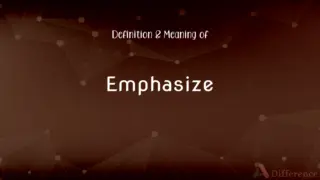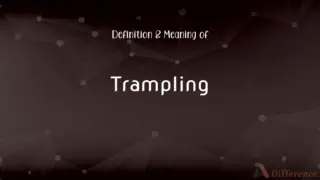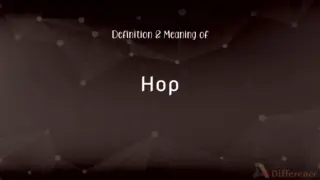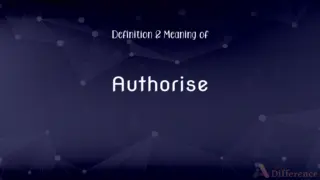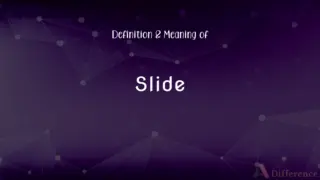Wearoff Definition and Meaning
By Tayyaba Rehman & Fiza Rafique — Updated on March 5, 2024
Wear off means to gradually diminish in effect or intensity until it disappears. e.g., The pain from the injury started to wear off after a few hours.
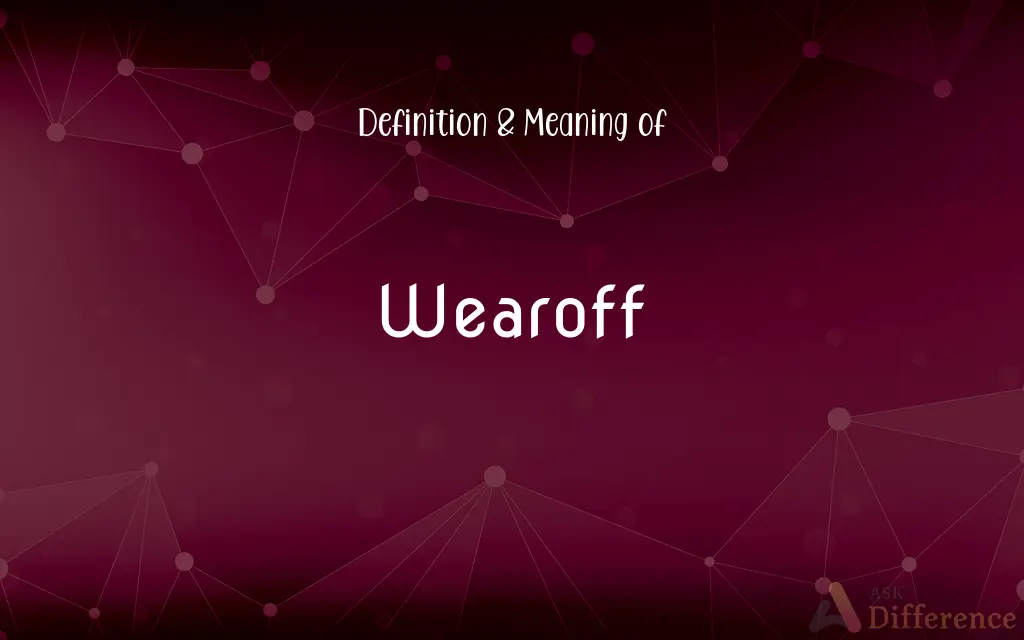
Table of Contents
Wearoff Definitions
To slowly cease to be effective.
The local anesthesia was beginning to wear off.
To become less acute or strong.
Her headache began to wear off after resting.
For a sensation or feeling to gradually diminish.
The sense of awe from the view started to wear off.
To gradually lose strength or effectiveness.
The medication's effects began to wear off.
To fade or disappear over time.
The initial excitement of the trip started to wear off.
To diminish gradually in intensity.
The storm's fury began to wear off as it moved inland.
For something to become less noticeable or potent.
The numbness from the cold started to wear off.
Wearoff Snonyms
Diminish
Make or become less.
The pain began to diminish after taking the medicine.
Dissipate
Disperse or scatter.
The clouds dissipated, and the sun began to shine through.
Disperse
Distribute or spread over a wide area.
The crowd dispersed quickly after the concert ended.
Decline
Become smaller, fewer, or less; decrease.
The number of applicants has begun to decline.
Subside
Become less intense, violent, or severe.
The storm finally subsided around midnight.
Wane
Decrease in vigor, power, or extent; become weaker.
Interest in the project waned over time.
Fade
Gradually grow faint and disappear.
The initial excitement of the trip began to fade.
Ebb
Gradually lessen or reduce.
His enthusiasm for the project ebbed away.
Evaporate
Disappear; vanish.
Her anger evaporated once she understood the situation.
Vanish
Disappear suddenly and completely.
The magician made the coin vanish from his hand.
Wearoff Idioms & Phrases
Wear off over time
For something to gradually lose its effectiveness or appeal as time passes.
The effectiveness of the marketing campaign started to wear off over time.
Wear off the edge
To diminish the intensity or sharpness of something, often referring to emotions or feelings.
Time helped to wear off the edge of her anger, allowing her to think more clearly.
Let it wear off
To allow something, typically a feeling or a substance's effect, to diminish naturally over time.
After the dental procedure, he decided to let the anesthesia wear off before driving home.
Waiting for it to wear off
Expecting or hoping that a certain condition or feeling will diminish.
She was just waiting for the headache to wear off so she could resume her work.
Wear off the excitement
For enthusiasm or eagerness to gradually decrease.
As the semester progressed, the initial excitement about college began to wear off.
Wear off the initial shock
For the initial reaction of surprise or dismay to fade away.
It took a few days for the initial shock of the news to wear off.
Wear off the pain
For discomfort or suffering to gradually lessen.
He hoped that rest would help wear off the pain in his injured leg.
Wear off the fear
For a feeling of fear or apprehension to gradually decrease.
As she became more familiar with the process, her initial fear started to wear off.
Wear off the shine
For something to lose its initial luster or appeal.
Constant use began to wear off the shine of the new car.
Wear off the gloss
For something to lose its superficial charm or attractiveness.
The daily grind of the job quickly wore off the gloss of working at a high-profile company.
Wear off the effect
For the influence or impact of something to gradually diminish.
They were waiting for the medicine to wear off the effect before conducting tests.
Wear off the tension
For a state of nervousness or strain to diminish over time.
A good night's sleep helped to wear off the tension from the stressful day.
Wear off the rough edges
To soften or reduce the severity of something's less appealing aspects.
Experience helped to wear off the rough edges of his personality.
Wear off the bitterness
For feelings of resentment or bitterness to gradually lessen.
Time and understanding helped to wear off the bitterness he felt after the argument.
Wear off the curiosity
For an inquisitive interest in something to lessen as one becomes more familiar with it.
Once she learned how the machine operated, her curiosity began to wear off.
Wear off the enthusiasm
For eagerness or excitement about something to decrease over time.
The long wait for the release began to wear off the enthusiasm among fans.
Wear off the confusion
For a state of perplexity or uncertainty to clear up over time.
Further explanations helped to wear off the confusion surrounding the new policy.
Wearoff Example Sentences
As the day went on, her energy began to wear off.
He waited for the anesthesia to wear off after the surgery.
She felt more relaxed as her nervousness began to wear off.
The wear off of the storm left the town peaceful again.
The sleepiness from the medicine started to wear off by morning.
As the sun rose, the chill in the air began to wear off.
After the long walk, the soreness in his legs started to wear off.
She could feel the effects of the long run beginning to wear off.
The wear off of the sedative allowed the patient to wake up.
Common Curiosities
How is wear off used in a sentence?
Example: "The effects of the painkiller began to wear off after a few hours."
How do we divide wear off into syllables?
"Wear off" is divided as "wear-off."
Why is it called wear off?
"Wear off" refers to the gradual disappearance or reduction of an effect or condition over time, like medication's effectiveness diminishing or paint fading.
What is the pronunciation of wear off?
Wear off is pronounced as /wɛər ɒf/.
How many syllables are in wear off?
There are two syllables in "wear off."
What is the verb form of wear off?
"Wear off" itself is the verb form.
What is another term for wear off?
Another term for "wear off" could be "diminish" or "fade."
What is the singular form of wear off?
As a verb, "wear off" doesn't have a singular or plural form.
What is a stressed syllable in wear off?
The stressed syllable in "wear off" is on the first word: "wear."
What is the root word of wear off?
The root word is "wear," with "off" added to create the phrasal verb implying reduction or disappearance.
Is wear off a noun or adjective?
"Wear off" is a phrasal verb, not a noun or adjective.
Is wear off an adverb?
No, "wear off" is not an adverb.
Is the wear off term a metaphor?
"Wear off" can be used metaphorically to describe the fading or diminishing of intangible things, like feelings or effects.
Which determiner is used with wear off?
Determiners are not typically used directly with the verb "wear off."
What is the plural form of wear off?
As a verb, "wear off" remains the same regardless of singular or plural usage.
Which vowel is used before wear off?
The use of a vowel before "wear off" depends on the context of the sentence.
What part of speech is wear off?
"Wear off" is a phrasal verb.
Is wear off an abstract noun?
"Wear off" is a verb, not a noun.
Is the word “wear off” a Direct object or an Indirect object?
"Wear off" is a verb phrase and thus does not serve as a direct or indirect object.
Is wear off a negative or positive word?
"Wear off" is neutral; its connotation depends on the context.
Is wear off a countable noun?
"Wear off" is not a noun; it's a verb.
Is wear off a collective noun?
"Wear off" is not a noun, so it cannot be a collective noun.
Is the word wear off Gerund?
The gerund form related to "wear off" would be "wearing off."
Which preposition is used with wear off?
"Wear off" may not typically require a preposition for its meaning, but context will dictate usage.
Which conjunction is used with wear off?
Conjunctions like "and," "but," or "before" can be used with "wear off," depending on sentence construction.
What is the opposite of wear off?
The opposite could be "intensify" or "increase."
Is wear off a vowel or consonant?
"Wear" starts with a consonant sound.
Is the word wear off imperative?
"Wear off" can be used in imperative constructions in specific contexts, but it's not common.
Which article is used with wear off?
Articles are not used directly with the verb "wear off."
Share Your Discovery

Previous Term
Layoff Definition and Meaning
Next Term
Jump Definition and MeaningAuthor Spotlight
Written by
Tayyaba RehmanTayyaba Rehman is a distinguished writer, currently serving as a primary contributor to askdifference.com. As a researcher in semantics and etymology, Tayyaba's passion for the complexity of languages and their distinctions has found a perfect home on the platform. Tayyaba delves into the intricacies of language, distinguishing between commonly confused words and phrases, thereby providing clarity for readers worldwide.
Co-written by
Fiza RafiqueFiza Rafique is a skilled content writer at AskDifference.com, where she meticulously refines and enhances written pieces. Drawing from her vast editorial expertise, Fiza ensures clarity, accuracy, and precision in every article. Passionate about language, she continually seeks to elevate the quality of content for readers worldwide.







